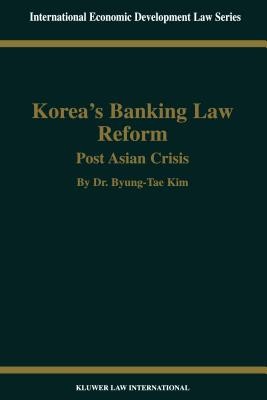
- We will send in 10–14 business days.
- Author: Byung-Tae Kim
- Publisher: Kluwer Law International
- Year: 2002
- Pages: 256
- ISBN-10: 9041198954
- ISBN-13: 9789041198952
- Format: 16.7 x 25.7 x 2 cm, hardcover
- Language: English
- SAVE -10% with code: EXTRA
Reviews
Description
Ever since Korea succumbed to the East Asian economic crisis in 1997, its financial sector has been restructuring itself in accordance with the terms of an IMF bail-out package, in addition to meeting urgent domestic banking needs. All this is taking place in the context of an international convergence of supervisory standards in the banking industry, spearheaded by the General Agreement on Trade in Services (GATS) and the "Core Principles" of the Basel Committee for Bank Supervision. This nexus of events makes the current reform of Korean banking laws of special significance as an example and a test of the "new international financial architecture" as it can be observed at work in a developing industrial economy. This book is the first in-depth analysis of Korea's banking law reform program, its complex sources, its particular rules, the effect of international commitments as well as "soft law", the extent of economic recovery to date, and the trends and developments in banking practice and regulation likely to occur in the near future. In the process the author examines such pervasive issues as the following: the need for both short-term and long-term banking sector infrastructures and the tension this creates the clear necessity to satisfy deep-seated societal predispositionsthe role of foreign banksensuring the transparency of bank managementthe role of banking regulatory institutionsand the importance of domestic financial stability in the global free market system By revealing the implications for Korea of the international banking and financial standards and principles that are coming into effect throughout the trading world, Korea's Banking Law Reform lays bare the underpinnings of a domestic financial system geared to work efficiently in international financial markets, yet designed to protect its own "safety and soundness." This is a book to be read and studied by all professionals working in the financial sector, whether bankers, regulators, advisors, or investors.
EXTRA 10 % discount with code: EXTRA
The promotion ends in 17d.16:29:07
The discount code is valid when purchasing from 10 €. Discounts do not stack.
- Author: Byung-Tae Kim
- Publisher: Kluwer Law International
- Year: 2002
- Pages: 256
- ISBN-10: 9041198954
- ISBN-13: 9789041198952
- Format: 16.7 x 25.7 x 2 cm, hardcover
- Language: English English
Ever since Korea succumbed to the East Asian economic crisis in 1997, its financial sector has been restructuring itself in accordance with the terms of an IMF bail-out package, in addition to meeting urgent domestic banking needs. All this is taking place in the context of an international convergence of supervisory standards in the banking industry, spearheaded by the General Agreement on Trade in Services (GATS) and the "Core Principles" of the Basel Committee for Bank Supervision. This nexus of events makes the current reform of Korean banking laws of special significance as an example and a test of the "new international financial architecture" as it can be observed at work in a developing industrial economy. This book is the first in-depth analysis of Korea's banking law reform program, its complex sources, its particular rules, the effect of international commitments as well as "soft law", the extent of economic recovery to date, and the trends and developments in banking practice and regulation likely to occur in the near future. In the process the author examines such pervasive issues as the following: the need for both short-term and long-term banking sector infrastructures and the tension this creates the clear necessity to satisfy deep-seated societal predispositionsthe role of foreign banksensuring the transparency of bank managementthe role of banking regulatory institutionsand the importance of domestic financial stability in the global free market system By revealing the implications for Korea of the international banking and financial standards and principles that are coming into effect throughout the trading world, Korea's Banking Law Reform lays bare the underpinnings of a domestic financial system geared to work efficiently in international financial markets, yet designed to protect its own "safety and soundness." This is a book to be read and studied by all professionals working in the financial sector, whether bankers, regulators, advisors, or investors.


Reviews